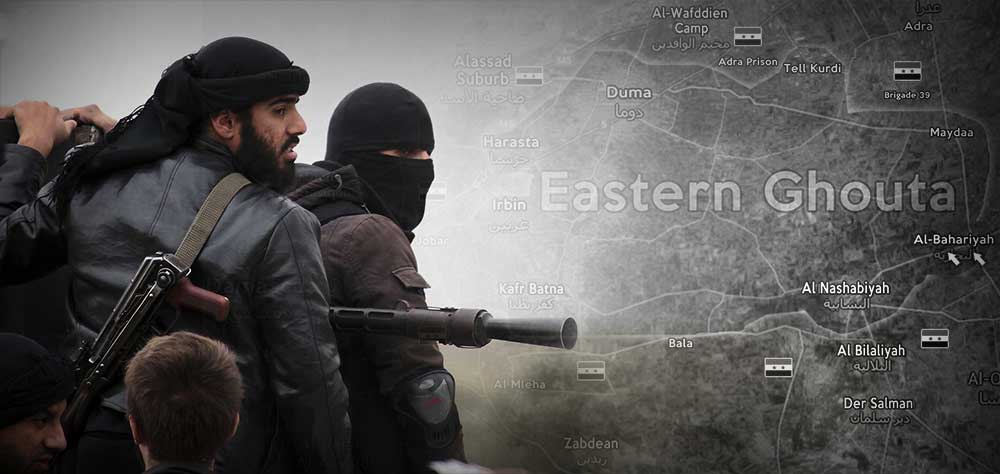
RNA - For a long time, the Syrian capital Damascus has been regularly pounded by the rockets and mortars coming from the neighboring Eastern Ghouta. This situation continued until last week when the Syrian government launched a major operation to liberate the city from a set of terrorist groups. The operation, however, has been met with propagandistic coverage of the Western and Arab media, signaling that keeping the city was of utmost significance to the terrorists and their foreign backers.
On Thursday, media reported that some Western states pushed for a United Nations Security Council resolution to press the Syrian army to cease its anti-terror campaign. The vote on the resolution was delayed several times as Russia questioned the content of the draft, saying that it required some changes.
Once terrorist groups in Eastern Ghouta were struggling for holding areas closer to the capital to quickly seize the presidential palace once the government of President Bashar al-Assad collapses; but things have changed today as they struggle for surviving. Key foreign actors like the US, France, and Germany which during the seven-year conflict went to great lengths to oust the Syrian leader are now striving to save lives of the terrorists.
Vast tracts of the Eastern Ghouta are held by the three terrorist groups, Jaysh al-Islam, Al-Nusra Front, and Faylaq al-Rahman. Since its capture, the city became a site for regular and indiscriminate rocket and mortar firings into the capital. Damascus has also been target of terrorist bombing operations which were designed in its terrorist-held suburb, Eastern Ghouta. But following a meeting in Cairo on 22 July 2017, Eastern Ghouta became a de-escalation zone, joining a series of other Syrian cities.
Russia, Turkey, and Iran brokered the deal on de-escalation zones and the same trio serves as the guarantor. The four regions assigned for the deal include Idlib, parts of Homs and Hama in the north, Quneitra and Daraa in the south, the western Syria, and also Eastern Ghouta. According to the agreement, the Syrian army can continue fighting the ISIS terrorist group and Al-Nusra which is a branch of Al-Qaeda in Syria. But it is banned from carrying out attacks on other armed groups, unless they violate the ceasefire accord.
In the past few weeks, Eastern Ghouta-based militants breached the terms of the deal by expanding their circle of action and conducted mortar attacks on all districts of Damascus on a daily basis, forcing Syrian government to make a move. The government, regaining control of a large part of the terrorist-seized territories, has found the opportunity ripe to liberate the city, which in case of remaining under the opponents’ control can be used as a bargaining chip on the negotiating table prospectively. General Suheil al-Hassan, the successful commander of the special Tiger Force, has recently visited Eastern Ghouta, sending a strong message to the militants that this time the government is firmly resolved to recapture the enclave.
Record of seven years of anti-Damascus Western-Arab camp interventions proves that when their favorable terrorist groups are on the threshold of defeat, the West's diplomacy apparatus and media raise humanitarian concerns and call for a truce under which the terrorists are given some breathing time.
The Russian Ria Novosti agency has reported that the US is mobilizing units of ISIS and other terrorist groups in Idlib and other areas in a bid to be sent to Al-Tanf, a town in the western province of Homs which is home to an American forces’ base. The final aim is to deploy them to the Eastern Ghouta fronts to foil the Syrian army’s cleaning operation.
Russia, a staunch ally of Syria that is well aware of the US plans for long-term conflict and consequently long-term military presence in the war-torn country, pressed for the exclusion of the takfiri groups from the ceasefire. One of the armed groups with no immunity to the Syrian army’s fire is Hay’at Tahrir al-Sham, which rebranded itself from al-Nusra Front. Moscow argues that there are no guarantees that the armed groups will keep committed to the de-confliction pact.
The experts cast doubt on the honesty of the Western concerns about the lives of the civilians in the contested city, arguing that if the West does not instrumentally use the armed groups for its own political gain, then it should feel responsibility for the liberation of the defenseless citizens trapped in the grasp of the terrorists in Eastern Ghouta. But it is now known to everybody that the West, and particularly the US, is playing with the card of the terrorists to put strains on Russia and Iran. The moderate solution is the transfer of the terrorists from Eastern Ghouta to Idlib and handover of the city to the central government’s forces that will put an end to the deadly clashes. Before the onset of operation, Moscow called on the terrorists to lay down their arms and safely relocate to another region that was faced with their rejection.
Source: Alwaght
847/940